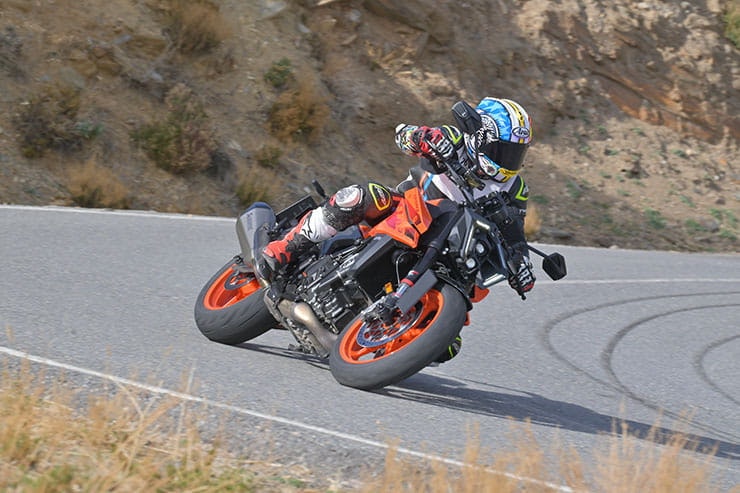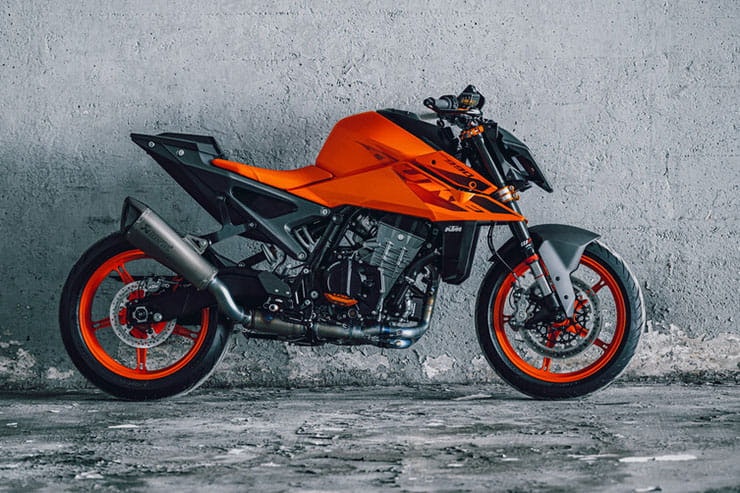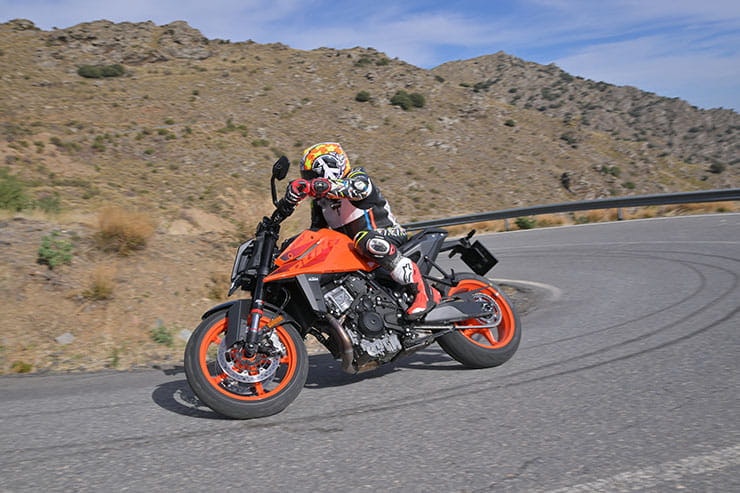KTM 990 Duke (2024) - Review
BikeSocial Road Tester
28.02.2024
Technical Review: Ben Purvis
Riding Review: Adam ‘Chad’ Child
Price: £12,999 | Power: 121.4bhp | Weight: 190kg | Overall BikeSocial Rating: 5/5
The KTM 990 Duke is 96% a new mode, so says the manufacturer, and takes over from the highly acclaimed 890 Duke. It houses the new ‘990’ parallel twin engine - a substantially redesigned version of the ‘LC8c’ design used in the 790 and 890 Duke models. Pushing the parallel-twin Duke inexorably towards the litre mark, the new engine measures in at 947cc (up from 889cc for the ‘890’) and will form the basis of a whole new line of 990 models in the years to come. We packed Mr Child off to Spain for a day of testing on the road to find out if KTM have improved an already superb naked middleweight.
Bigger engine remains remarkably compact
Lightweight design means new Duke is just 190kg including a full tank of fuel
Styling takes an aggressive shift towards the 1390 Super Duke R’s look
Highly enjoyable bike to ride
Awesome performance and handling
KTM’s angry new family ‘face’ isn’t going to win many beauty contests
Paying to unlock software features after 1500km using them in ‘demo’ mode still grates
Licence-losing potential
High price compared to the competition
KTM 990 DUKE (2024) Review
Full road test of KTM’s new-for-2024 990 DUKE which supersedes the 890 Duke. Adam ‘Chad’ Child spend a day on the Spanish roads for your benefit.
2024 KTM 990 Duke Price
At £12,999 the all-new 990 Duke is a substantial step up compared to its 890 Duke predecessors which started at £10,699 for the Duke GP or £11,599 for the Duke R but with the reintroduction of the cheaper 790 Duke to the range there’s no shortage of options and the new model bridges the chasm between the parallel twin offerings and the £17,999 1390 Super Duke R – itself expected to be supplanted by an uprated 1390 model in the near future.
KTM’s offering two colours on the new 990 Duke for 2024: Black Metallic or the company’s signature Electronic Orange.
For 2024 KTM has made a clearer distinction between the Duke family in the Austrian factory's long-running naked range. From the revamped-for-2024 125 Duke priced at £4899, to the similarly refreshed-for-2024 390 Duke at £5699. The next logical step is the 790 Duke, priced at £7999, and then (with the 890 Duke now removed from the line up) the Duke 990 at £12,999. Finally, you have the 1390 Super Duke R, which starts at £17,999.
PCP prices for the 990 Duke start at £179 per month, a big step up from £99 per month for the 790. The demo mode Tech Pack is £887.08 or, with its components sold individually: Adaptive Brake Light: £89.70, Quickshifter+: £316.25, Track Pack: £452.15, MSR: £89.70, Cruise Control: £252.79.
2024 KTM 990 Duke Engine & Performance
The engine still carries the LC8c name – that stands for Liquid-Cooled, 8-valve, Compact – and shares the same parallel twin layout as its predecessor, but it’s substantially updated in the 990 Duke.
Visually the differences are subtle – the oil sight glass is moved to the clutch cover, and there’s an extra band of bracing on the cylinder block compared to the previous LC8c – but on closer inspection virtually every component is new, both inside and out.
Within, there’s a new crankshaft to provide the 70.4mm stroke, up from 68.8mm, and the pistons are bigger to fill the 92.5mm bores, increased from 90.7mm, resulting in an overall capacity increase of 58cc over the 890 model.
The compression ratio is unchanged at a high 13.5:1, and the power increase is modest – KTM claims 121.4bhp (123PS, 90.5kW) compared to 114bhp (115.5PS, 85kW) for the 890 Duke R. The peak power comes at 9,500rpm, with max torque of 76lb-ft (103Nm) at 6,750rpm.
The engine breathes through a full stainless-steel exhaust and meets the latest Euro5+ emissions standards thanks to new exhaust oxygen sensors that monitor the gasses and constantly adapt the fuel injection to suit.
There are three riding modes and the option to add two more, and like several other current KTM models there’s a range of optional electronics that can be activated purely by unlocking software that’s already built-in. Initially, buyers can use a ‘demo mode’ for 1500km that unlocks these features, including the Quickshifter+ and Track mode, but you have to pay if you want to keep using them after that point.
The new 990 Duke press test was solely road-focused, and the glorious swathes of tarmac in southern Spain proved to be the perfect habitat for the bike’s perfect blend of power and torque. The 990's exhilarating but proportional output demonstrated that 121-and-a-bit horsepower is more than enough – to the point where I was running out of superlatives.
The re-worked LC8c has a close to perfect balance of qualities. It's smooth at slow speeds – perky and friendly – but deliciously punchy when the pace picks up. Open the throttle and it drives from pretty much anywhere: linear, strong and wildly entertaining as it runs up and down its addictive midrange. Peak power arrives at 9,500rpm but, in the mountain passes KTM chose for this test, I rarely went near those revs. Instead, the Duke shredded the road with its pin-sharp handling (more in a moment) and elastic spread of torque, revving freely and pulsing harder, shovelling the bike between apexes with just the odd shortshift thrown in to keep the tacho floating about in that tractive midrange. Sure, there are only 121 horses on board but, with just 190 kilos of lightweight motorcycle to haul and oodles of well-spread newton-metres on tap, that was always enough. That wide midrange is brilliant, as is the LC8c's sweetly metered and accurate fuelling.
The 990 might feel a tad under-clubbed on a big fast racetrack – Donington, say – but only against rabid, foaming-at-the-mouth 200bhp superbikes, and only then on the straights. In every other situation, that balance of fully-useable power and torque – of early drive and pure traction – give it the energy to punch way above its numbers. It would murder a 600 supersport on the way out of corners, and many bigger machines too.
2024 KTM 990 Duke Handling & Suspension (inc. Weight & Brakes)
The 990 Duke’s frame is an all-new steel tube design, claimed to be 8% stiffer laterally and have 5% more torsional rigidity than its predecessor, while the new swingarm is a whopping 35% less rigid than before to help improve traction, as well as being 1.5kg lighter than the previous design, thanks to being diecast under gravity instead of under high pressure.
Unlike earlier models, the frame rails now run outside the swingarm pivot point, increasing its rigidity in that area, and the pivot bolt itself is now forged to add more strength.
The dimensions are changed, too, with a 24.2-degree head angle instead of 24.3 degrees and 1476mm wheelbase, down from 1481mm. As before, the seat subframe is cast alloy and the suspension inevitably comes from WP, with 43mm Apex forks offering 140mm of travel and featuring split function tech, so compression is adjusted on one leg, rebound on the other. At the back there’s a WP Apex monoshock adjustable for preload and rebound.
The brakes are dual 300mm discs gripped by KTM-branded four-pot radial calipers and paired with a 240mm rear disc and two-piston caliper. KTM’s cornering ‘Supermoto’ ABS is standard, and new front disc carriers save 500g per side to reduce unsprung and rotating mass.
All-in, with a full tank of fuel, the 990 Duke comes in at 190kg. Without fuel, the weight is 179kg.
The result of these changes is simply an excellent handling road bike, one on which I felt at home the moment I threw a leg over the relatively low (825mm) seat. I loved its priceless lack of bulk and weight, and the way the bars seemingly found my hands rather than the other way round. Three minutes into the ride, it felt like my bike and we immediately clicked.
The 990 rolls on Bridgestone S22 rubber that warmed up quickly and immediately gave feedback and confidence. As we tucked into the twisting roads laid on by KTM I felt confident enough to carry heroic levels of corner speed and lean on roads I’d never ridden. The steering is light and accurate, you can change line mid-corner without clenching while the chassis doesn't care if you climb all over it or sit tight in the saddle.
Its natural corner speed is a joy and helps the bike flow like few others can. Feedback is absolute, ground clearance isn’t an issue: just let off the stoppers and carry the speed. Suspension? The WP APEX set up is multi-adjustable but on the road I wouldn’t touch it – it works out of the box on showroom settings.
During the test, the optional race dash recorded lean angles between 45 and 49 degrees, which hints that we were riding a little close to the edge, but that's not how it felt. The chassis' feedback backed up by excellent rider aids allowed a brisk run ride in relative safety. On those tight and twisty, imperfectly surfaced roads, I wouldn’t have wanted to be on any other bike.
2024 KTM 990 Duke Comfort & Economy
A reasonably low 825mm seat height suggest the Duke should fit most riders – it’s only 5mm higher than the 890 Duke – and the new model’s seat is at less of an angle to stop you from sliding forwards towards the tank. The pillion seat is more noticeably raised than before, sitting 20mm higher than the 890 Duke’s, to increase the passenger legroom.
The 760mm wide bars promise to give plenty of control and can be adjusted to four possible positions. There are two mounting positions for the bar risers on the top yoke, and the risers can also be reversed to shift the bars back and forth.
KTM claims an impressive 60.1mpg economy, which means the 14.8-litre fuel tank should give a maximum range of around 195 miles.
It’s slightly unusual to have a bike so intensely focused on delivering a full-on sporting blast and also so comfortable and practical too. The 990 is very light, but it’s still stable, and is relatively roomy and certainly not toy-like. And as usual KTM hasn’t short-changed customers on suspension because the ride quality is plush despite the bike's racy handling courtesy of its sister brand under the Pierer Mobility hat: WP Suspension.
Our test ride was relatively short. We need to visit the 990 again to test its long-range comfort, fuel economy and, if we can find a brave enough pillion, even the improved passenger legroom. It’s a naked bike, so high-speed touring wasn’t on the KTM design sheet, but the riding position and general ergonomics should be okay for a long stint in the saddle.
2024 KTM 990 Duke Equipment
The 990 Duke, like so many rivals, gets a 5-inch TFT colour dash that accesses all its main functions. It’s an optically-bonded design to give a clear display and includes a USB-C charging port.
The standard model gets three riding modes – Rain, Street and Sport – and the optional ‘Performance’ and ‘Track’ modes can be added instantly by unlocking software. Rain mode restricts power to 105hp, softens throttle response and maximises the traction control settings. Street setting gives full power, uses the mid setting for throttle response and traction control, and allows a limited amount of front wheel lift. Sport mode gives sharper throttle response, less traction control and allows maximum wheelie potential.
The optional Performance setting allows customisation of the traction control and throttle response and lets you choose to switch off the anti-wheelie. It also adds a launch control function and cruise control. Track mode, also a software option, has the same settings but adds more information on the dash including lap times and disables the cruise control.
The new-look headlight is LED, flanked by DRLs that automatically adjust their intensity depending on the ambient light level.
The 5-inch TFT dash is clear, and I love the Track mode's bold rev counter and live lean angle, with acceleration and deacceleration neatly represented by informative graphics. The switchgear is okay, just not initially intuitive.
The 990 is made in Austria – the 790 Duke and smaller Dukes are assembled in India – and on first impressions quality levels seem high, as you'd expect from its £12,999 price tag. And, of course, as noted earlier, should you want to keep all the rider aids you are going to have to spend a further £887 for the Tech pack. Cruise Control is £252.79 and a slip-on Akrapovic silencer is £1177.
2024 KTM 990 Duke Rivals
With nearly a litre of capacity and over 120hp on tap the 990 Duke is into quite a serious performance class. Buyers are likely to compare it with machines like Yamaha’s newly-uprated MT-09 and MT-09 SP, as well as Triumph’s Street Triple RS and perhaps even Kawasaki’s Z900.
Triumph Street Triple 765 RS | Price: £11,295
Power/Torque: 128.2bhp/59lb-ft | Weight: 188kg
Yamaha MT-09 SP | Price: £TBA
Power/Torque: 117.3bhp/68.6lb-ft | Weight: 193kg
Kawasaki Z900 SE | Price: £11,229
Power/Torque: 123.6bhp/72.7lb-ft | Weight: 212kg
2024 KTM 990 Duke Verdict
As you can probably tell, I thoroughly enjoyed my afternoon ride on KTM’s new 990 Duke. The combination of the new punchy and torque-packed LC8c engine and redesigned chassis is the perfect recipe for a sporty road ride, especially on the switchback mountains roads of southern Spain.
I had a blast – an uncomplicated and hugely enjoyable ride that genuinely delivered on KTM's marketing hype and showed yet again that you don't need vast amounts of power on the road. But it’s not just about performance: the 990 is roomy, has great ride quality, an informative dash and an excellent suite of rider aids to back you up should you get carried away.
Priced at just under £13,000 it is expensive compared to the competition, which, in the shape of Triumph's Street Triple 765 especially, is also bloody brilliant. Meanwhile, Yamaha has a new MT-09 SP just around the corner too. But I keep thinking about how I didn’t want this test ride to end, and now I really cannot wait to ride it again.
If you’d like to chat about this article or anything else biking related, join us and thousands of other riders at the Bennetts BikeSocial Facebook page.
2024 KTM 990 Duke - Technical Specification
Looking for motorcycle insurance? Get a quote for this motorbike with Bennetts bike insurance
What is MCIA Secured?
MCIA Secured gives bike buyers the chance to see just how much work a manufacturer has put into making their new investment as resistant to theft as possible.
As we all know, the more security you use, the less chance there is of your bike being stolen. In fact, based on research by Bennetts, using a disc lock makes your machine three times less likely to be stolen, while heavy duty kit can make it less likely to be stolen than a car. For reviews of the best security products, click here.
MCIA Secured gives motorcycles a rating out of five stars (three stars for bikes of 125cc or less), based on the following being fitted to a new bike as standard:
A steering lock that meets the UNECE 62 standard
An ignition immobiliser system
A vehicle marking system
An alarm system
A vehicle tracking system with subscription
The higher the star rating, the better the security, so always ask your dealer what rating your bike has and compare it to other machines on your shortlist.


